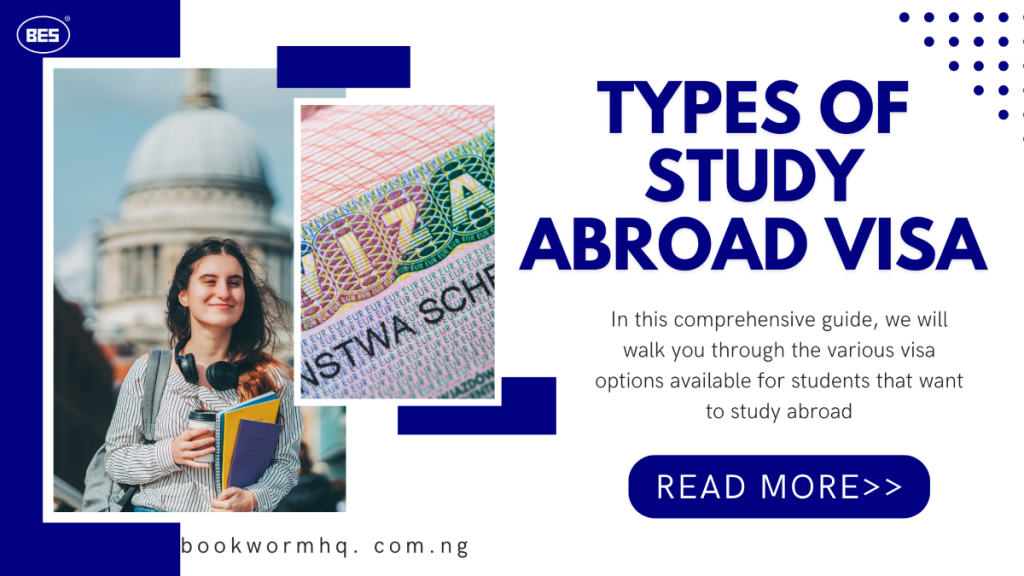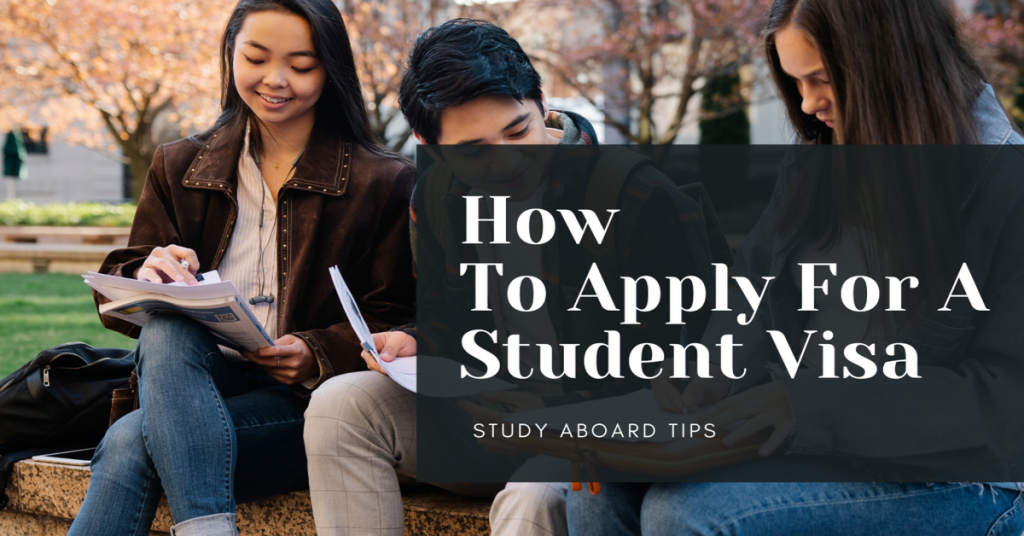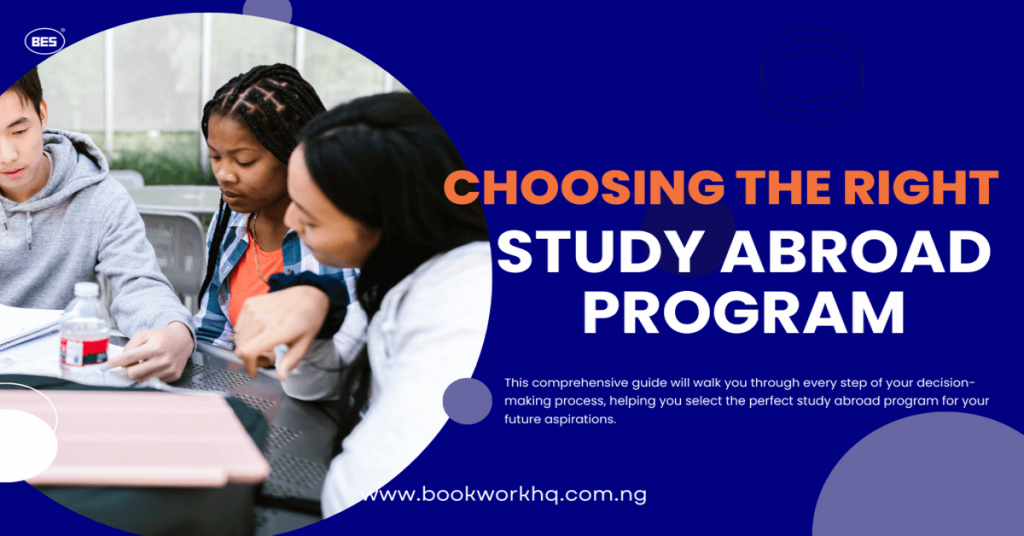
Studying abroad is an exciting opportunity that can open doors to new experiences, cultures, and career prospects. Whether you dream of pursuing a degree in a foreign country or simply want to participate in an international exchange program, understanding the different types of visas available for studying abroad is essential. In this comprehensive guide, we will walk you through the various visa options, linking to external resources for detailed information and related articles on our website to enhance your knowledge further.
1. Student Visa (F-1, J-1)

The most common visa for international students in the United States is the F-1 visa, while the J-1 visa is often used for exchange programs. These visas allow you to study full-time at accredited institutions and typically require proof of acceptance at a U.S. school.
A. F-1 Student Visa
The F-1 visa is the quintessential student visa for those aspiring to study in the United States. It allows international students to enroll in accredited academic institutions, including universities, colleges, language schools, and conservatories. Here are the key features of the F-1 visa:
Eligibility:
To qualify for an F-1 visa, you must meet the following criteria:
- Acceptance: You must have been accepted by a U.S. educational institution.
- Financial Resources: You should demonstrate sufficient funds to cover your tuition and living expenses.
- Non-immigrant Intent: You must prove that your primary purpose for coming to the U.S. is to study, not to immigrate permanently.
Duration:
The F-1 visa typically allows students to stay in the U.S. for the duration of their academic program, plus an optional period of practical training (Optional Practical Training or OPT) for up to 12 months after graduation.
Application Process:
- Receive Acceptance: First, secure admission to a U.S. institution.
- Receive Form I-20: Your school will issue a Form I-20, which you’ll need to complete the application.
- Pay SEVIS Fee: Pay the Student and Exchange Visitor Information System (SEVIS) fee.
- Complete DS-160: Fill out the DS-160 form online.
- Pay Visa Application Fee: Pay the visa application fee.
- Attend Visa Interview: Schedule and attend a visa interview at the nearest U.S. embassy or consulate.
External Resources for F-1 Visa:
B. J-1 Exchange Visitor Visa
The J-1 visa is designed for exchange visitors participating in programs that promote cultural exchange, including students, professors, scholars, and researchers.
Here’s what you need to know about the J-1 visa:
Eligibility:
The J-1 visa is versatile and can cover various exchange programs. Eligibility criteria may vary, but typically include:
- Sponsorship: You must be sponsored by a designated exchange program sponsor.
- Program Purpose: You should participate in a program that aligns with the J-1 visa’s cultural exchange objectives.
Duration:
The J-1 visa allows for varying durations, depending on the specific program. It can range from a few weeks to several years.
Application Process:
- Choose a Program: Find an eligible J-1 exchange program.
- Get a DS-2019 Form: Your program sponsor will provide you with a DS-2019 form.
- Pay SEVIS Fee: Pay the SEVIS fee.
- Complete DS-160: Fill out the DS-160 form online.
- Pay Visa Application Fee: Pay the visa application fee.
- Attend Visa Interview: Schedule and attend a visa interview at the nearest U.S. embassy or consulate.
Read more; https://davisic.princeton.edu/immigration/current-students/differences-between-f-1-and-j-1
Interested in Scholarships?
If you’re looking for financial aid options to support your education abroad, check out our detailed guide on LinkedIn: https://www.linkedin.com/posts/bookwormng_studyabroad-scholarshiptips-educationopportunities-activity-7105163051728814080-Qxmk?utm_source=share&utm_medium=member_desktop
External Resources for J-1 Visa:
- U.S. Department of State – Exchange Visitor Visas
- Exchange Visitor Program – Bureau of Educational and Cultural Affairs
2. Work and Study Visas

Some countries offer work and study visas that allow you to work part-time while pursuing your education. For example, Canada’s Study and Work Permit enables students to gain valuable work experience while completing their degrees. Read more: https://www.canada.ca/en/immigration-refugees-citizenship/services/application/application-forms-guides/guide-5269-applying-study-permit-outside-canada.html
Canadian Study and Work Permit
Canada is renowned for its world-class education system and its welcoming stance towards international students. The Canadian Study and Work Permit, also known as the Post-Graduation Work Permit (PGWP), is an excellent example of a Work and Study Visa program. Here’s what you need to know:
Eligibility:
To be eligible for the Canadian Study and Work Permit, you must:
- Enroll in a Designated Learning Institution: You should study at a recognized Canadian institution.
- Meet Study Program Requirements: Your study program must be full-time and last at least eight months.
- Apply within 180 Days: You must apply for the PGWP within 180 days of receiving your final transcript and an official letter confirming program completion.
- Hold a Valid Study Permit: You need to maintain a valid study permit throughout your stay in Canada.
Duration: The PGWP allows you to work in Canada for a period equal to the length of your study program, up to a maximum of three years.
Application Process:
- Study in Canada: First, enroll in a designated learning institution in Canada and obtain a study permit.
- Complete Your Program: Successfully complete your program.
- Apply for PGWP: Within 180 days of receiving your final transcript and official program completion letter, apply for the PGWP online.
- Pay Application Fee: Pay the required fee for the PGWP application.
- Wait for Processing: Wait for the processing of your application and the issuance of your PGWP.
External Resources for Global Post-Study Work Opportunities:
- United Kingdom – Post-Study Work Visa (Graduate Route)
- Australia – Post-Study Work Stream Visa (485 Visa)
- New Zealand – Post-Study Work Visa (Open)
3. Schengen Visa
If you’re considering studying in Europe, the Schengen visa is worth exploring. This visa allows you to travel within the Schengen Area, comprising 26 European countries, making it an excellent choice for those who wish to explore different cultures while studying.
Types of Schengen Visas
There are several types of Schengen Visas, and the one you need depends on the purpose of your visit:
A. Schengen Short-Stay Visa (Type C): This is the standard Schengen Visa for short stays, including tourism, business meetings, and, most importantly for students, studying for a short duration.
B. Schengen Long-Stay Visa (Type D): If your course of study in a Schengen country exceeds 90 days, you will need a Schengen Long-Stay Visa, which allows for extended stays.
C. Student Schengen Visa: Some Schengen countries offer a specific student visa category that caters to the needs of international students. This visa is designed for those pursuing full-time education in a Schengen country.
Applying for a Schengen Visa
The application process for a Schengen Visa typically involves the following steps:
- Determine the Schengen Country: Identify the Schengen country where you will be studying or spending the most time.
- Prepare the Required Documents: Gather the necessary documents, including proof of enrollment, financial means, travel itinerary, and travel insurance.
- Submit Your Application: Submit your visa application to the embassy or consulate of the chosen Schengen country.
- Attend an Interview: In some cases, you may need to attend a visa interview.
- Wait for Processing: The processing time for Schengen Visas can vary but is typically within 15 calendar days.
External Resources for Schengen Visas
For detailed information on the Schengen Visa application process, specific requirements, and visa fees, it’s advisable to refer to the official websites of the Schengen countries’ embassies or consulates. Here are some external resources to get you started:
4. Exchange Visitor Visa (J-1)

The J-1 visa is not only for students but also for exchange visitors, including scholars, professors, and researchers. If you’re part of an academic exchange program, this visa may be your gateway to enriching experiences. Read more
Key Features and Categories of the J-1 Visa
The J-1 visa encompasses a wide range of categories, each tailored to specific types of exchange programs. Here are some of the most common J-1 visa categories:
A. J-1 Student Visa
The J-1 Student Visa allows foreign students to enroll in degree or non-degree programs at U.S. academic institutions. Students participating in exchange programs, including high school exchanges, can obtain this visa
B. J-1 Research Scholar Visa
The J-1 Research Scholar Visa is for professors, researchers, and experts who come to the United States for research purposes. It’s an excellent choice for those seeking to collaborate with U.S. institutions and enhance their research skills.
C. J-1 Short-Term Scholar Visa
The J-1 Short-Term Scholar Visa is designed for individuals, including professors, researchers, and experts, who want to engage in short-term academic activities or research projects in the United States.
D. J-1 Intern Visa
The J-1 Intern Visa is for individuals looking to gain practical work experience in their field of study. It’s an ideal option for students and recent graduates seeking internships with U.S. companies
E. J-1 Teacher Visa
The J-1 Teacher Visa is specifically for foreign teachers who wish to teach in primary and secondary schools in the United States. It promotes cross-cultural understanding and enhances the quality of education in U.S. classrooms.
Eligibility and Application Process
Eligibility criteria and application processes may vary depending on the specific J-1 visa category. However, some common requirements and steps include:
General Eligibility Criteria:
- Sponsorship: You must be sponsored by an approved Exchange Visitor Program (EVP) sponsor in the United States.
- Proof of Funding: You should demonstrate adequate financial support to cover your stay in the United States.
- Intent to Return: You must have a residence in your home country and intend to return upon completion of the exchange program.
- English Proficiency: Depending on the program, you may need to demonstrate English proficiency.
Application Process:
- Select a Program: Choose an Exchange Visitor Program that aligns with your goals and interests.
- Obtain a DS-2019 Form: Your program sponsor will issue a DS-2019 form, which is crucial for your visa application.
- Pay SEVIS Fee: Pay the Student and Exchange Visitor Information System (SEVIS) fee.
- Complete DS-160: Fill out the DS-160 form online.
- Pay Visa Application Fee: Pay the visa application fee.
- Attend Visa Interview: Schedule and attend a visa interview at the nearest U.S. embassy or consulate.
For detailed information on J-1 visa categories, program sponsors, and application procedures, refer to the official websites and resources:
- U.S. Department of State – Exchange Visitor Visa
- Exchange Visitor Program – Bureau of Educational and Cultural Affairs
5. Family or Dependent Visas

If you’re planning to bring your family along while studying abroad, it’s essential to understand the family or dependent visa options available. Many countries offer visas for spouses and children of international students.
Types of Family or Dependent Visas
The specific types and eligibility criteria for Family or Dependent Visas vary from one country to another. However, here are some common categories:
A. Spouse or Partner Visas:
These visas are typically available to the legal spouses or registered domestic partners of international students. They allow spouses/partners to live, work, or study in the host country for the duration of the student’s program.
B. Child or Dependent Visas:
Children or other dependent family members of international students can often obtain visas to accompany the student. These visas grant access to education or other benefits depending on the host country’s regulations.
C. Parent Visas:
In some cases, parents or legal guardians of international students may be eligible for Family Visas, particularly for young students or in countries with specific family reunification programs.
D. Extended Family Visas:
Certain countries extend Family Visas to grandparents, siblings, or other close relatives under exceptional circumstances. Eligibility criteria can be stringent.
Eligibility and Application Process
Eligibility criteria and the application process for Family or Dependent Visas differ significantly depending on the host country. However, some common factors often include:
- Relationship Proof: You’ll typically need to provide documentation proving your relationship to the international student, such as marriage certificates or birth certificates.
- Financial Support: Many countries require evidence that the student can financially support their dependents.
- Health Insurance: You may need to provide proof of health insurance coverage for your dependents.
- Application Submission: You will usually need to submit a visa application to the host country’s immigration authorities or embassy/consulate.
- Interview: In some cases, you and your dependents may need to attend a visa interview.
External Resources for Family or Dependent Visas
For specific information on Family or Dependent Visas in your host country, it’s crucial to refer to the official websites of the country’s immigration authorities or embassy/consulate. Here are some external resources to help you get started:
- U.S. Department of State – Family-Based Visas (U.S.)
- UK Visas and Immigration – Join Family in the UK
- Government of Canada – Sponsor Your Family
6. Language Course Visa

For those seeking to enhance their language skills abroad, language course visas are a fantastic option. These visas often allow you to study a language intensively for a specified period. Read more
Eligibility and Application Process
Eligibility criteria and application processes for Language Course Visas vary from one country to another. However, here are some common factors:
- Acceptance by a Language School: You’ll need to secure admission to a recognized language school or program in the host country.
- Proof of Financial Means: Many countries require evidence that you can financially support your stay and education.
- Language Proficiency: Some programs may have language proficiency prerequisites, while others offer courses for beginners.
- Visa Application: Submit a visa application to the host country’s embassy or consulate.
- Interview: In some cases, you may need to attend a visa interview.
Popular Destinations for Language Courses
Several countries are renowned for their language schools and language learning opportunities. Here are a few popular destinations:
A. France:
Renowned for its language schools, France offers an ideal setting to learn French while savoring the rich culture and cuisine.
B. Spain:
Spanish language courses in Spain provide a vibrant learning experience combined with the country’s lively atmosphere.
C. Germany:
Germany’s language schools offer a chance to master the German language while exploring its history and landscapes.
D. Japan:
Learning Japanese in Japan offers a unique blend of modernity and tradition, making it an exciting destination for language enthusiasts.
E. Italy:
Italy’s language courses allow you to learn Italian while enjoying its art, history, and cuisine.
External Resources for Language Course Visas
For specific information on Language Course Visas in your host country, it’s essential to refer to the official websites of the country’s immigration authorities or embassy/consulate. Here are some external resources to help you get started:
- French Ministry of Foreign Affairs – Studying in France
- Spanish Government – Language Courses Visa
- German National Visa – Language Course Visa
- Japan Visa Information – Student Visa (Language Courses)
- Italy Student Visa – Study Visas for Language Courses
7.Postgraduate and Research Visas

If you’re planning to pursue a postgraduate degree or engage in research abroad, specialized visas may be available to support your academic endeavors. These visas often come with extended stay options.
Eligibility and Application Process
Eligibility criteria and application processes for Postgraduate and Research Visas vary from one country to another. However, here are some common factors:
- Completed Qualifications: You’ll typically need to have completed a relevant degree or research program at a recognized institution in the host country.
- Admission to a Program: If you plan to continue your studies, you’ll need to secure admission to a postgraduate or research program.
- Proof of Funds: You may be required to demonstrate that you have sufficient financial means to support yourself during your stay.
- Research Proposal: Researchers often need to submit a research proposal outlining their project’s objectives, methodologies, and expected outcomes.
- Visa Application: Submit a visa application to the host country’s immigration authorities or embassy/consulate.
- Interview: In some cases, you may need to attend a visa interview.
Global Destinations for Postgraduate and Research Studies
Several countries are renowned for their postgraduate and research programs. Here are a few popular destinations:
- United States:
The U.S. offers a vast array of research opportunities and postgraduate programs in various fields, attracting students and researchers from around the world.
- United Kingdom:
Known for its prestigious universities and research institutions, the UK provides a conducive environment for postgraduate and research endeavors.
- Australia:
Australia offers cutting-edge research opportunities, especially in fields like science, technology, engineering, and mathematics (STEM).
- Germany:
Germany is celebrated for its robust research culture and numerous postgraduate programs conducted in English.
- Canada:
Canada’s research initiatives and postgraduate programs make it an attractive destination for academics and researchers.
External Resources for Postgraduate and Research Visas
For specific information on Postgraduate and Research Visas in your host country, refer to the official websites of the country’s immigration authorities or embassy/consulate. Here are some external resources to help you get started:
Connect with Us for More Information
At Bookworm Educational Services, we are dedicated to providing you with the most up-to-date and comprehensive information on studying abroad. Don’t forget to connect with us on our social media platforms for regular updates, study tips, and inspiring stories from fellow international students:
Facebook: https://web.facebook.com/bookwormng
Instagram: https://www.instagram.com/bookwormngr/
LinkedIn: https://www.linkedin.com/company/bookwormng/
For personalized advice and assistance with your study abroad journey, feel free to contact our experts today.
In conclusion, studying abroad is a life-changing experience, and understanding the different types of visas available is a crucial step in making your dream a reality. Each visa category comes with its own set of requirements and benefits, so it’s essential to research thoroughly and plan accordingly. We hope this guide has been informative and that you’re now better equipped to embark on your international educational journey. Safe travels and happy studying!
Note: Visa regulations and requirements can change, so always verify the latest information from official government sources or embassy websites before applying for a visa.




Pingback: Elementor #2521 · Bookworm Educational
Pingback: Tips for Preparing For Standardized exams · Bookworm Educational